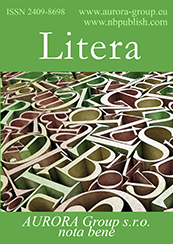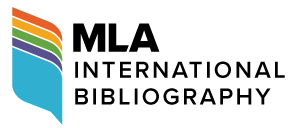Interpretation
Reference:
Vorobei, I. (2016). The Concept of Lied (Song) in Rainer Maria Rilker's 'The Book of Hours'. Litera, 1, 1–8. https://doi.org/10.7256/2409-8698.2016.1.18346
Abstract:
The subject of the present article is the linguistic representation and interpretation of the poetic concept of Lied ('Song') in the cycle of poems 'The Book of Hours' written by an Austrian poet of the 20th century Rainer Maria Rilker. The author of the article describes two types of the linguistic representation of the poetic concept and offers methods for analyzing the poetic concept taking into account the processes of dissipation and crystallization of sense. The main content of the article is devoted to the interpretation of the concept under review. Vorobey analyzes lexical and sense bearing structures of the concept of Lied and establishes relations with other concepts from the cycle of poems. To study the poetic concept, the author offers to apply the hermeneutic-linguistic method that is based on the combination of Roland Barthes' method of textual analysis as well as the method of predicate nests and the method of hermeneutic circle. The novelty of the research is caused by the fact that the author fills the gap in researches jof the poetic concepts in Rainer Maria Rilker's creative writing. So far researchers have not analyzed or interpreted his poetic concepts, neither have they created a model of the entire concept sphere of the poetic world in The Book of Hours. The novelty of the research is also caused by the fact that the author creates a new method for analyzing a poetic text. This method combines linguistic and hermeneutic methods.
Keywords:
interpretation, dissipation of sense, crystallization of sense, sense, poetic concept, Schweigen (silence), Lied (song), hermeneutic-linguistic method, The Book of Hours, Rainer Maria Rilker
Fiction
Reference:
Ignatova, I.V. (2016). Government as the Sphere of Representation of the Concept of 'Power' in Youth Dystopian Novels of the Early XXIst Century (Anaylsis of Suzanne Collins' The Hunger Games' Trilogy). Litera, 1, 9–17. https://doi.org/10.7256/2409-8698.2016.1.18457
Abstract:
Subject of the analysis of article is language representation of a concept "power" at the description of a state system of society in art work anti-Utopia of the beginning of the 21st century. The political concept "power" verbalized in all languages which carriers live in the society operated on the basis of the imperious relations is one of the most difficult owing to the ambiguity and valuable orientation. Having assumed that the sphere of the state is extremely significant for creation of a picture of the fictional world in anti-utopian novels, the author describes ways of verbalization of the studied concept on material of the popular youth trilogy anti-Utopia S. Collins "Hungry Games". The interpretative analysis of the revealed means of verbalization of a concept "power" including as key words-reprezentanty, so their wide and narrow contextual environment proves multidimensionality, complexity and valuable orientation of the studied mental essence, and also confirm the thesis about dual essence of the power: the "ideal" state, as a rule, the democracy, exercises "the power for" the people, achievement of social justice in society, freedoms, happiness, welfare; his contrast (the totalitarian state with the governor despot) realizes the "power for the sake of the power" installation through "the power over" the individual and society by means of tyranny, system of punishments, deprivation or extreme restriction of vital resources, shadowing, standards of behavior and the interpersonal relations. Novelty of work consists in the choice as material of research of the concept "power" which is typically staticized in a political discourse, the text of youth art work anti-Utopia of the beginning of the 21st century, definition of the leading imperious installations for the sphere of the state which are staticized as "the power over" a people at large for the purpose of providing "the authorities for" the tyrant.
Keywords:
political discourse, sphere of life, key word, state, power, verbalization, concept, president, anti-utopia, young-adult fiction
Linguistics
Reference:
Nilogov, A.S. (2016). 'Snipping' as the Name (Antilanguage Methodology in Aid of DNA-Genealogy). Litera, 1, 18–25. https://doi.org/10.7256/2409-8698.2016.1.17670
Abstract:
In article the problem of allocation of new snips (one-nucleotide polymorphisms) as a lingvo-philosophical problem of the name ("onomafication") of our far ancestors is considered, still, it is possible, not having own names, but which it is possible to allocate/distinguish on the basis of assignment of serial number of snips as in any biological (in this case - genetic) of taxonomy. To us the problem of a "snipping"/snipping as the name "/antroponimofication" of far ancestors seems essential: from Y-chromosomal Adam through all nodal points (gapgroups / snips) to documentary confirmed factology of classical genealogy. The following methods are used in the research: anti-language, genetic (Y-chromosomal DNA testing), genealogical, DNA-genealogical, source study, heuristic method. The novelty of research is caused by the fact that the author establishes the interdisciplinary connection between two modern methods of scientific knowledge: anti-language methodology and by the DNA methods - genealogy (genetic genealogy). This allows to fulfil an opportunity as DNA genealogy due to expansion of anthroponimia factology when the documentary and source study base of classical genealogy, and anti-language methodology by means of inclusion of new types of anti-words in structure DNK-genealogisms is settled.
Keywords:
Balanovsky, Klesov, Fedorov, snipping, onomafication, DNA-genealogism, anthroponym, DNA-genealogy, snip, antilanguage methodology
Intertextuality
Reference:
Bondareva, E.P., Podgornaya, E.A., Chistyakova, G.V. (2016). Self-Presentation Online: the Gender Aspect. Litera, 1, 26–34. https://doi.org/10.7256/2409-8698.2016.1.18772
Abstract:
The aim of the research is gender analysis of communication strategies and tactics by which the Internet users of online dating sites create free-text (without multiple choice option) self-presentations. The data for the study are the profiles made up by Russian and English-speaking men and women aged 18 to 60. The data are analyzed by means of three methods: descriptive, comparative and quantitative. The analysis results show five universal speech strategies: Self-characterization, Addressee’s characterization, Purpose of searching, Representing an ideal situation, Orientation to communication, which are verbalized in self-presentations of both Russian- and English-speaking men and women in online dating sites. Each speech strategy has a certain set of communication and speech tactics that are described from gender position. Furthermore, the authors point out two commonly used speech strategies: Self-characterization and Addressee’s characterization. The researchers conclude that there are no fundamental gender differences in choosing men’s or women’s specific speech strategies. The gender preferences reveal in the choice of tactics, communication and speech.
Keywords:
profiler, online dating site, communicative tactics, speech strategy, communicative strategy, gender, self-presentation, speech tactics, universal tactics, gender-based tactics
Modernism
Reference:
Krotovskaya, N.G. (2016). D. Ashton. Coming of Surrealism (Translation). Litera, 1, 35–44. https://doi.org/10.7256/2409-8698.2016.1.18785
Abstract:
The author considers history of distribution of surrealistic views in art, literature and the humanities at first in Europe, and then in America where there were the special conditions complicating assimilation of the European theories. The surrealism, though was the cleaning movement opposing the European intellectual tradition, actually from it was inseparable. Exposing Cartesian cliches and isolation of the French culture, poets from André Breton's environment as a matter of fact built a pantheon to intellectuals of all nations.In America the situation was another. Till thirtieth years there was no alloy of art and social theories. Special questions of art and policy which solution surrealists have bravely addressed couldn't be put successfully in America till an era of the Great depression. When in the mid-thirties surrealists have faced prompt decline of Europe and distribution of fascism, they, a handful of excentric individuals, still battled against society. Americans, on the contrary, just assimilated with society and tried to change it from within. Persistent search of viable tradition was the main constant subject of publications of that time. Though surrealists in words rejected the past, they constantly looked for in it rudiments of new ideas, the basis necessary for any theory.
Keywords:
surreailsm, crisis of consciousness, artistic tradition, pragmatism, documentation, irrationailty, mythmaking, psychoanalysis, Marxism, internationalism
The Stream of books
Reference:
Gurevich, P.S. (2016). Romantic Arrangement of Spirit (Reviews of the Books 'Mikhail Yurievich Lermontov' and 'Nikolay Vasilievich Gogol' Written by N. Kotlyarevsky). Litera, 1, 45–53. https://doi.org/10.7256/2409-8698.2016.1.18690
Abstract:
The article is devoted to works of the famous Russian literary critic Nestor Aleksandrovich Kotlyarevsky. Thanks to Svetlana Yakovlevna Levitte's efforts it was succeeded to publish two monographs of this researcher devoted to M. Yu. Lermontov and N. V. Gogol's creativity. N. A. Kotlyarevsky could collect biographic materials which have accumulated at the end of the 19th century about M. Yu. Lermontov's life and to show creativity of this author on a wide historical background. The researcher was interested first of all a subject of "demonic natures", the social conflicts and internal intense life of the poet. Addressing N. V. Gogol's creativity, N. A. Kotlyarevsky sought to reveal secrets of soul of the writer, to show connection with creativity of other Russian authors. About life and works of the called authors is written much. Also details of their spiritual aspirations are investigated. However N. A. Kotlyarevsky's monographs haven't lost the value. On the contrary, they can be an example of serious and versatile studying of works of the called artists. The author uses in this case methods of historico-literary research. He widely is guided by archival documents. Also hermeneutical method helping to get deeply into details of works of writers is applied. In article experience of monographic research of creativity of two famous representatives of the Russian literature is estimated: Lermontov and Gogol. Are analyzed not only texts of works, their semantic maintenance, the reader plunges into a stream of biographic details. The analysis of works is realized on the basis of reflections about intense spiritual life of these authors.
Keywords:
imagination, activity, ideal, feelings, reason, freedom, Russian history, ethics, novel, poetry
 This work is licensed under a Creative Commons Attribution-NonCommercial 4.0 International License.
This work is licensed under a Creative Commons Attribution-NonCommercial 4.0 International License.











 © 1998 – 2025 Nota Bene. Publishing Technologies. NB-Media Ltd.
© 1998 – 2025 Nota Bene. Publishing Technologies. NB-Media Ltd.




